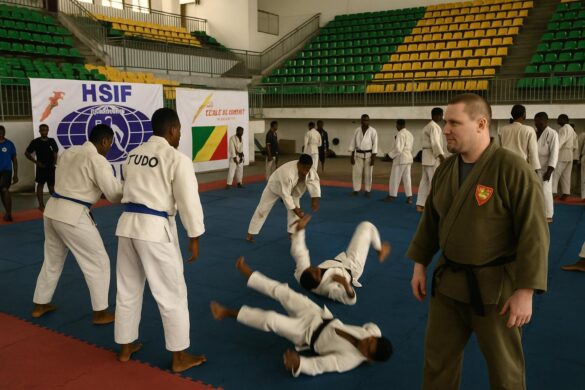Youth Flock to the Revolutionary Gym at the Lycée
Inside the cavernous gym of the Lycée de la Révolution, whistles cut through the humid air as over a hundred young Congolese practice kicks, throws, and grappling holds under the watchful eyes of visiting Russian masters. The October 13th session marked the official launch of close-combat training in Brazzaville.
A Discipline Forged in Russian Special Forces
Coach Anastacia Aliochina reminded curious parents that this sport, simply called ‘close combat’ in French, originated from Soviet and Russian special forces as a practical self-defense method. Over time, refined techniques from karate, taekwondo, judo, and boxing were blended into a unique competitive code.
From Classified Drills to Civilian Arenas
In 2006, the International Close-Combat Federation was created, opening tournaments to civilians across Eurasia and beyond. Federation records show sixty-five member nations, a figure coaches repeat with pride to recruits eagerly wrapping their wrists. Regular continental championships now offer podiums and television exposure.
African Scene Highlights Momentum
The latest African Championship was recently held in Morocco, confirming the continent’s growing appetite. Russian Grand Master Sergey Mashulin, who led the Brazzaville clinic, noted that Congolese delegations closely observed the event and returned convinced a national program could elevate local fighters to that stage.
Free Registration Sparks Widespread Interest
Globus, the NGO leading the project, deliberately waived registration fees to remove financial barriers. Posters in the Moungali district advertise daily sessions and the loan of protective gear. For many teenagers, the open-door policy offers a rare opportunity to train under internationally certified coaches without leaving the capital.
Learning Curve on the Mat
Christ-Junior Ntombo, sixteen, sweaty after sparring drills, said the Russian style forces him to think faster than in traditional karate. “The transitions from standing to the ground are constant,” he explained, wiping his face. “It’s like playing chess, except your body is the pieces.”
Russian Expertise on Congolese Mats
Mornings begin with warm-ups led by Mashulin, whose resume includes training Russian national champions. Afternoons belong to assistant coaches who alternate between strikes, wrestling, and scenario drills simulating street situations. Observers from the Ministry of Sports occasionally take notes, signaling institutional curiosity about the methodology.
Diplomacy Speaks Through Sport
Standing near the national flags, Globus founder Yulia Berg presented the sessions as another layer of the Congolese-Russian partnership. She recalled the regular presidential meetings that already cover technology, education, and mining. “Sport builds trust quickly,” she told journalists, adding that cultural exchanges often last longer than resource-based agreements in the region today.
